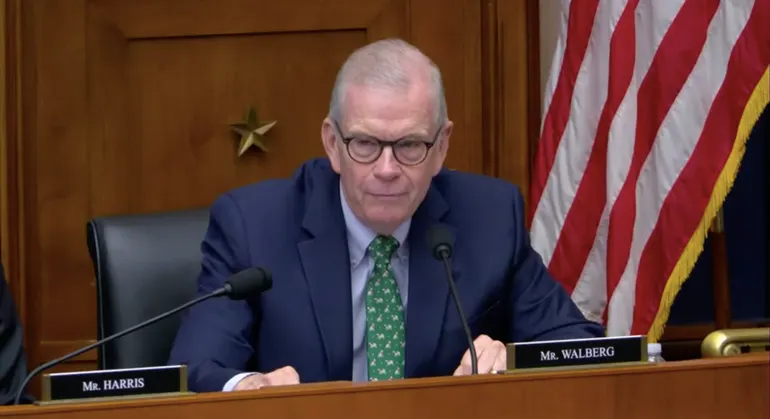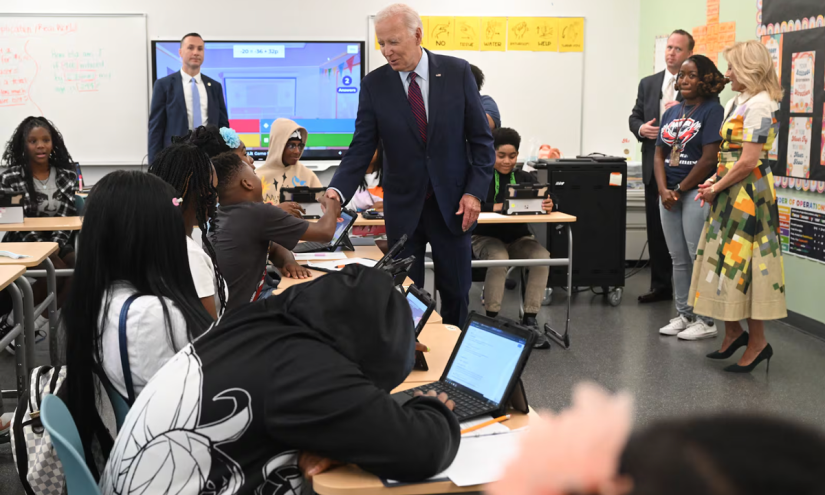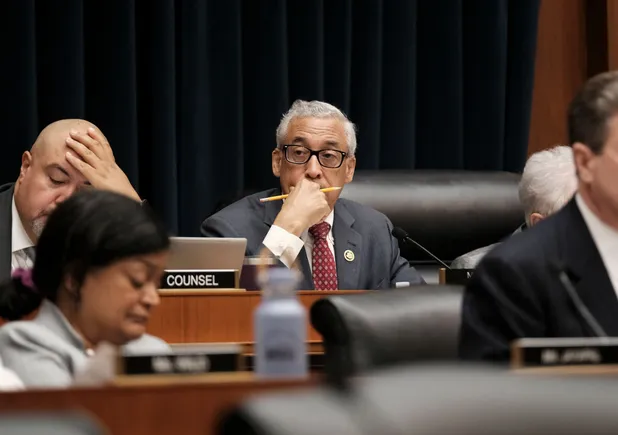When Virginia’s new Democratic leaders took control of the governor’s office and attorney general position last week, they wasted no time overhauling higher ed.
Abigail Spanberger, the new governor, immediately appointed more than two dozen members to the governing boards of the Virginia Military Institute, George Mason University and the University of Virginia, meaning she’s already appointed the majority of members on the George Mason and UVA boards. Her Republican predecessor, Glenn Youngkin, stocked university boards with conservatives who cracked down on diversity, equity and inclusion initiatives. UVA went through high-profile controversies under its Youngkin-era board, including the resignation of former president Jim Ryan under pressure.
Now, Spanberger’s appointees—at least 13 of whom donated to her gubernatorial campaign—are expected to lead universities in a different direction. Spanberger also signed an executive order Saturday directing her education secretary to assess the board member appointment process and recommend legislative changes, including possible modifications to term lengths, term starts and reappointments. In the order, Spanberger wrote that the Trump administration’s actions necessitate this review.
“Virginia colleges and universities have faced unprecedented challenges from shifts in federal policy to attacks on institutional autonomy and mission,” Spanberger said. “These pressures underscore the urgent need for the Commonwealth to reevaluate how governing boards are appointed, ensuring they are composed of individuals dedicated to upholding the quality, independence, and reputation of our institutions.”
The new attorney general, Jay Jones, also moved swiftly. He fired GMU’s university counsel K. Anne Gambrill Gentry and associate counsel Eli Schlam, leaving the institution with two remaining in-house lawyers, the university said. Jones also ousted VMI general counsel Patrick O’Leary; a spokesperson for the institution said O’Leary “notified us that he received a letter late last week informing him that his services were no longer required.”
Furthermore, on Tuesday, Jones’s office withdrew his Republican predecessor’s agreement with the Justice Department to disregard a state law that provides in-state tuition rates to undocumented students. The department sued the state Dec. 29, seeking to invalidate the law, and the next day—on his way out of office—former Virginia attorney general Jason Miyares concurred in a court filing that the law was unconstitutional.
In a news release on the reversal, Jones said, “On day one, I promised Virginians I would fight back against the Trump Administration’s attacks on our Commonwealth, our institutions of higher education, and most importantly—our students.”
And Democrat General Assembly members—who control both legislative chambers, including a supermajority in the House for the first time since the 1980s—have already expressed interest in higher ed changes. Senate Majority Leader Scott Surovell filed a bill in the current legislative session that would, among other things, lengthen governing board members’ terms from four to six years and add one faculty, one staff and one student voting member to each board.
Furthermore, House member Dan Helmer filed a resolution to create a task force to determine whether VMI—where the Youngkin-era board last year rejected a contract extension for the university’s top leader—should no longer be a public university that receives public funding. If the resolution passes, the task force will explore “expanding programs at other public institutions of higher education to replace the role of VMI” in training commissioned military officers.
Among other things, the resolution calls for the group to audit whether the university responded to a report to the 2021 State Council of Higher Education for Virginia detailing discrimination by initiating “any substantial changes” to “reduce acts within their student body that could be perceived or classified as racist, sexist, or misogynistic or as an act of sexual harassment or sexual assault,” and whether the university “possesses the capacity as an institution to end celebration of the Confederacy.”
In an email to Inside Higher Ed, a VMI spokesperson said, “We are reviewing many pieces of legislation, including Del. Helmer’s, and plan to work with our elected officials to demonstrate VMI’s progress.”
Altogether, the moves show state Democrats’ willingness to act quickly to counteract the rapid changes to higher ed that Republicans—at both the state and federal level—rushed into place last year. Democratic leaders don’t appear afraid of attracting the ire of the Trump administration after its interventions in 2025, including the Justice Department’s demand that Ryan step down from leading UVA and Justice and Education Department investigations into George Mason that observers feared would oust the president there.
But Surovell’s bill, and Spanberger’s recent statements to the General Assembly, also suggest that Democrats are seeking more than to bask in their newfound, but likely fleeting, power; they’re aiming to insulate higher ed decision-making from future political turnovers.
“Virginia has some of the finest colleges and universities in the world,” Spanberger told lawmakers in a Monday address. “And yet, news story after news story isn’t about their successes—it’s about them becoming political battlegrounds.”
She touted her review of the appointments process but added that she “will also work with this General Assembly to pursue reforms that prevent any future governor—Democrat or Republican—from imposing an ideological agenda on our universities. As governor, I have and will appoint serious, mission-driven individuals to our Boards of Visitors—people whose allegiance is to the institutions they serve, not to any political agenda.”
The state’s Republican Party didn’t respond to requests for comment Wednesday.
A Question of Stability
Walt Heinecke, past president of UVA’s American Association of University Professors chapter and a current member of the Virginia state AAUP conference’s executive committee, opposed Ryan’s ouster from UVA and the Youngkin-era board’s appointment of a new president on their way out the door.
“This has just been a mess for a year, and it’s important for us to clean house,” Heinecke said.
He said Democrats “realized that, since last January, there’s been an attempt to basically take over universities with the Trump agenda, and I think they’re sick and tired of the moves that have been made.”
Jon Becker, a tenured associate professor of educational leadership at Virginia Commonwealth University, said the speed with which Spanberger moved to appoint new board members was “no surprise.” Starting last year, Democrats blocked several of Youngkin’s board appointments, and those boards needed people.
“At UVA, they were effectively without a board,” Becker said, adding that George Mason’s board similarly lacked the required number of members to conduct business. He said it was “fairly urgent” for Spanberger to appoint members to allow those boards to function again.
Going forward, Becker said, “I would expect the focus on board reform to continue.”
“A good, thorough review would show that there are practices in other states that might bring better governance to higher education in Virginia,” he said, such as requiring geographic diversity on boards and other ways of making them more representative of the state. He said, “Board members are mostly … kind of wealthier people, and they really should be more representative of the citizens.”
But he also sees the Democratic moves as an attempt to tell the federal government to keep its hands off the state’s universities. And he said he thinks Virginia is indicative of what other states will do regarding higher ed when a single party takes control and realizes it needs to move fast to make change.
Alex Keena, a tenured associate professor of political science at Virginia Commonwealth, said, “I think what we’ve seen here in Virginia is a reflection of national trends, where national party politics is starting to influence how things are done at the state level.”
“You have positions in government that used to be insulated from partisan politics that are now like the latest battlegrounds,” Keena said. In certain cases, he said, Youngkin’s board appointments were “antagonistic to the whole project” of higher ed, or “had very extreme ideas about the future of higher ed.”
Now, Keena said, Democrats seem to be reacting to what the Youngkin and Trump administrations did last year, “which is this politicization of these boards that we really hadn’t seen in Virginia.” While Democrats will probably offer some stability for universities, he said, “it doesn’t really change the big picture—that you have this very hostile approach from the federal government.”
Keena said he wonders how Spanberger will respond to attacks from the Trump administration.
“How will she deal with that friction?” he said. “It’s a lot of uncertainty.”










